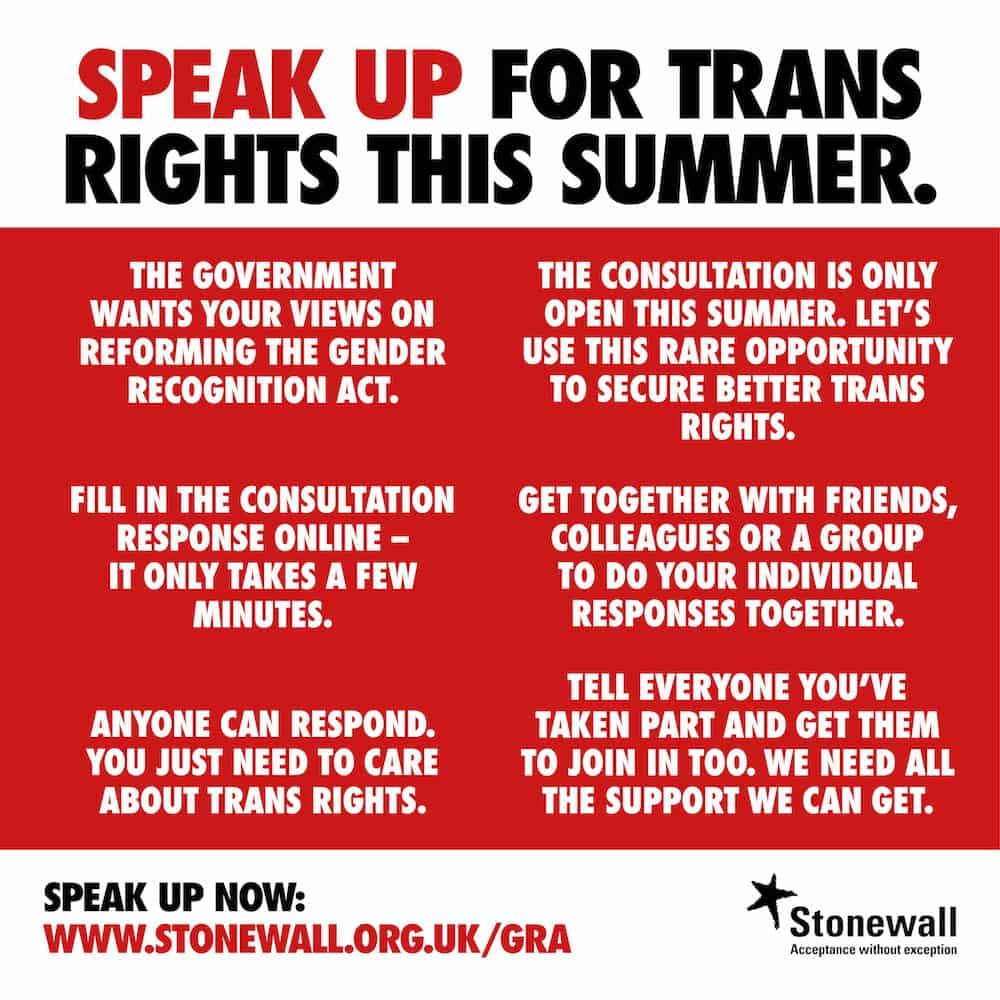Review of Gender Recognition Act is a chance to “Come Out for Trans Equality”
Charity groups, businesses and trans allies are supporting trans rights ahead of an important review of the Gender Recognition Act 2004. A full-page advert in today's Metro supporting the transgender community has been printed ahead of the government consultation on the Gender Recognition Act 2004.
The advert in the Metro today is in response to a full-page ad opposing transgender rights printed last week. That ad questioned whether someone with a penis is a woman and referred to transgender women as “male-bodied people.” It is now being investigated by the Advertising Standards Authority to see if it has violated advertising standards.
The Metro advert, which was paid for by LGBT+ rights charity Stonewall and Diva magazine, features more than 100 organisations that have “Come Out for Trans Equality.”
“We, along with 106 partner organisations, have created this advert to show our unwavering support for trans equality,” a Stonewall spokesperson told Happiful.
“Over the past year, we’ve seen a disturbing increase in hate directed at trans people in the media and online. We wanted to send out a clear message: we’re proud to stand with our trans family, colleagues, customers and friends and we will keep working, together, until we achieve equality for trans people everywhere. We encourage people to join our campaign to Come Out for Trans Equality and make sure they are being visible allies to trans people.”
Incredible 👏 Over 100 organisations from business, charity & public sectors have come together today to show our unwavering support for trans equality. Want to help? Fill in the government's #GRA consultation today to #ComeOutForTransEquality https://t.co/Ir1qEHL7La pic.twitter.com/mF8mks3mrn
— Stonewall (@stonewalluk) October 17, 2018
What is the Gender Recognition Act (GRA) 2004?
The GRA is the “process through which trans people are able to receive legal recognition of their acquired gender,” according to wording on the government’s consultation description.
The GRA, which was groundbreaking in 2004, governs how trans people can have their identity legally recognised. But much has changed in the past 14 years, making it seriously out of date and needing reform, which is why transgender people and their allies are urging the government to streamline the process for trans people to gain legal recognition as their chosen gender.
Currently under the GRA, trans people have to go through a series of intrusive medical assessments and long, demeaning interviews with psychiatrists in order to ‘prove’ their gender identity. Trans people currently need to have a formal diagnosis of ‘gender dysphoria’, must live in their ‘acquired gender’ for two years and have evidence supporting all of this to a gender recognition panel of clinicians, who have the power to approve or deny the person’s application. The process can take many years, puts a strain on the NHS and means that trans people cannot determine their own personal identity.
People who are non-binary (they don’t identify as either male or female) don’t have any legal recognition at all under the current GRA.
Why is the government looking to change the GRA now?
The government consultation states that since the GRA came into force, only 4,910 people have legally changed their gender. The government’s LGBT survey found that respondents wanted legal recognition but had not applied because they found the current process too bureaucratic, expensive and intrusive. As a result of that, the government is now asking for the public’s views on how to reform the legal recognition process.
The consultation will allow the government to gather feedback on proposed changes to the law, whether that means changing the existing law or introducing a new law. The government will outline the proposed changes and ask questions to help structure the feedback. The consultation process is a chance for trans people and their allies to have a say and to influence policy before MPs debate any new laws or bills in Parliament.
What does this mean for trans people in Britain?
“Trans people in Britain still face huge levels of abuse and inequality,” Laura Russell, Head of Policy at Stonewall told Happiful. “Stonewall research revealed that two in five trans people (41%) have had a hate crime committed against them in the last year, and one in eight trans employees (12%) have been physically attacked by colleagues or customers at work. This is unacceptable and is why we need change now.
“Reforming the GRA would be life-changing for so many trans people in Britain. Getting rid of a humiliating, dehumanising process to allow trans people to have their gender recognised by the state without being treated as having a mental illness would be a huge step forward towards equality. Other countries, including Ireland, Argentina and Norway have already made this change without any negative repercussions, just a hugely positive impact for trans people. “If we want to improve life for trans people, we need more people and organisations to be visible, active allies. One way that you can show your support for trans equality is by responding to the government’s consultation on the GRA.”
What can I do to help?
If you’d like to support the Come Out for Trans Equality campaign, Stonewall have provided a consultation form explaining the questions and providing its perspective to each question. You can sign the form, which takes about 5-10 minutes, before it closes on Friday 19 October and share your support using #ComeOutForTransEquality.



Comments